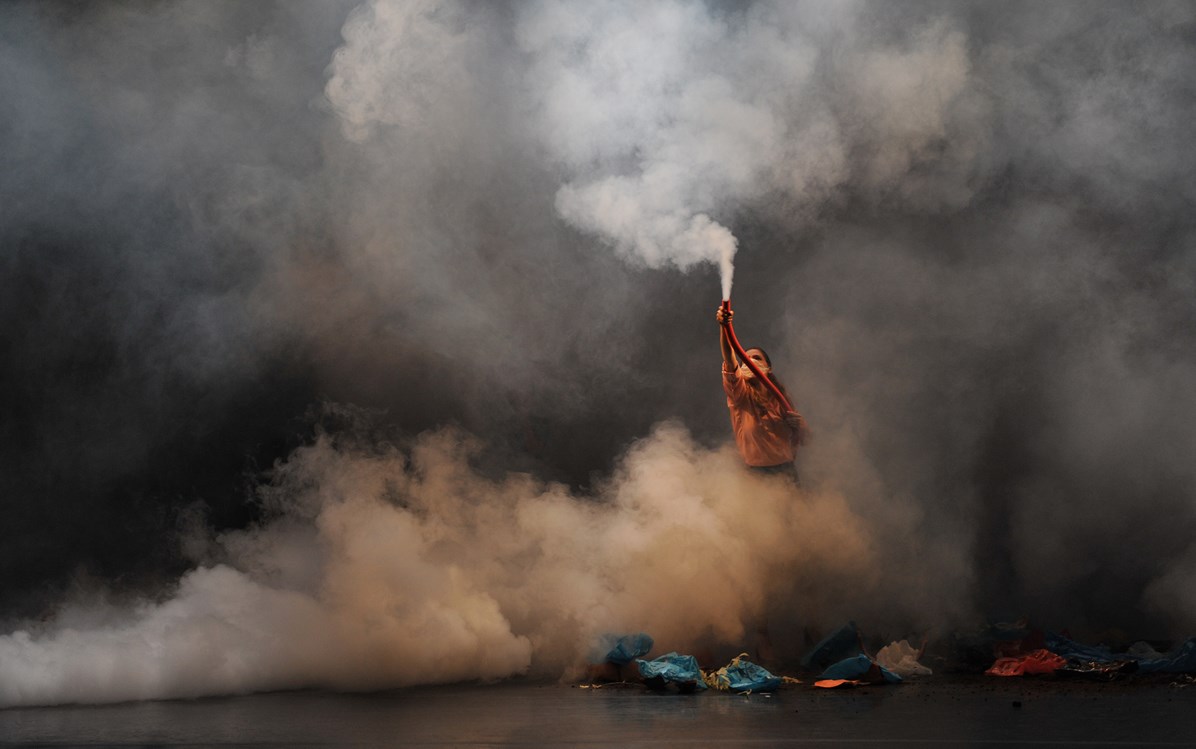Hegel wrote that ‘the owl of Minerva spreads her wings at dusk’ – meaning that historical understanding only takes place when a particular era or “shape of life” has “grown old”. Kierkegaard gave this an existential twist when he wrote that ‘life must be lived forwards, but it can only be understood backwards’. For Marx, more pithily, ‘history repeats itself, the first time as tragedy, the second time as farce’.
All three sayings applied to Belgian contemporary performance group Ontroerend Goed’s concept-driven and image-based work Are we not drawn onward to new erA, which was seen at Perth Festival last week.
In fact, it’s difficult to write about the show in other than abstract terms without spoiling it for those who may one day see it. This is because it depended on what’s called in theatre parlance a “reveal”, which occurred at a turning point (or, more precisely, given the content of the work, a tipping point) halfway through. However, prior to that (depending on the perspicacity of the viewer) there was a sudden (or dawning) realisation about the apparent senselessness of what was being said and done onstage, as well as the apparent senselessness of what we as a species are doing to the planet (as the saying goes, “we’ve got it backwards”).
The opening image (no spoiler here) was of a bare stage apart from a single tree standing in a mound of earth and a woman lying on the floor with her back to us. She was in contemporary clothes, but the image was already mythical, even Biblical (the tree bore a single apple). Soon she woke up, headed downstage and spoke in a mysterious language. Shortly afterwards she was joined by others – and by an increasingly mysterious accumulation of other objects, to which increasingly mysterious things were done.
Are we not drawn… was also about irreversibility. As Lady Macbeth says: ‘What’s done cannot be undone.’ In this show, the reverse turned out to be true – at least with the help of a certain technological trickery (which I won’t reveal here). However, despite its cleverness (which at times made us want to laugh or clap), this trickery only underscored its own deceptiveness. Any elation we felt was followed by sadness, because of the fundamental impossibility of what we were witnessing; we might laugh and clap, but (inwardly at least) we also wept.
What German aesthetics refers to as the “beautiful appearance” or “beautiful illusion” (schöne Schein) of art is, precisely, an appearance or illusion only – one that, according to Friedrich Schiller, acknowledges its own unreality. For Theodor W Adorno, all art is sad – not only because of the transitory nature of its illusions, but because it shows us (and here Adorno quotes Samuel Beckett) ‘how things are’.
In showing us ‘how things are’ both in its content and its form – which were perfectly matched and rigorously followed-through – Are we not drawn was a more sophisticated work than the two other shows I’ve seen in this Festival that dealt with ecological crisis. The sentimentality and anthropocentrism of The Jungle Book Reimagined (“man-cub saves the world”) or the fatalism and misanthropy of Food (“man eats the world”) were here surpassed by a meta-theatrical reflection on technology and live performance, and an aesthetic that was both as simple and as demanding as it needed to be.
To be sure, as in Food, there was an acknowledgement that (as a species and as individuals) “we need to leave” (this planet, this life). However, this recognition was humbler (and more modestly executed) than the former show’s final act of self-burial. Instead, there was a sense in Are we not drawn… that we must do what we can to “reverse” things, but also that, from a cosmic perspective, “all things must pass”, including ourselves.
Read: Theatre Review: Logue Lake, Perth Festival
Finally, the themes of irreversibility, illusions, transience and the melancholy sense of “how things are” also appeared in what may be called the “relationship plot” of the work, which concerned our relationships with each other – including love, as well as an acknowledgement of love’s inevitable failure. In this regard, it was no accident that (to my ears at least) the first (comprehensible) word spoken in the show was “eros” – and the last, “sorry”.
Are we not drawn onward to new erA
Ontroerend Goed
Director: Alexander Devriendt
Scenography: Philip Aguirre
Dramaturg: Jan Martens
Light, Video and Sound: Jeroen Wuyts and Babette Poncelet
Technical Assistance: Klaas Neyt and Jon Barron
Costumes: Charlotte Goethals and Valerie Le Roy
Composer: William Basinski
Arrangements: Joris Blanckaert
Finishing off Statue: Daan Verzele, Jelmer Delbecque, Jesse Frans
Cast: Angelo Tijssens, Giovanni Brand, Jonas Vermeulen, Ferre Marnef, Karolien De Bleser, Britt Bakker, Charlotte De Bruyne, Leonore Spee, Maria Dafneros, Kristien De Proost, Vincent Dunoyer, Michaël Pas
Are we not drawn onward to new erA was performed 21-25 February at the Heath Ledger Theatre, State Theatre of WA at Perth Festival.





